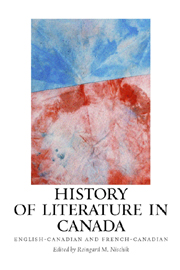Book contents
- Frontmatter
- Contents
- Acknowledgments
- Introduction: Writing a History of Literature in Canada
- I Beginnings
- 1 Aboriginal Oral Traditions
- 2 The Whites Arrive: White Writing before Canada, 1000–1600
- II The Literature of New France, 1604–1760
- III The Literature of British Canada, 1763–1867
- IV From the Dominion to the Territorial Completion of the Nation, 1867–1918
- V The Modern Period, 1918–1967
- VI Literature from 1967 to the Present
- Further Reading
- Notes on the Contributors
- Index
2 - The Whites Arrive: White Writing before Canada, 1000–1600
from I - Beginnings
Published online by Cambridge University Press: 12 September 2012
- Frontmatter
- Contents
- Acknowledgments
- Introduction: Writing a History of Literature in Canada
- I Beginnings
- 1 Aboriginal Oral Traditions
- 2 The Whites Arrive: White Writing before Canada, 1000–1600
- II The Literature of New France, 1604–1760
- III The Literature of British Canada, 1763–1867
- IV From the Dominion to the Territorial Completion of the Nation, 1867–1918
- V The Modern Period, 1918–1967
- VI Literature from 1967 to the Present
- Further Reading
- Notes on the Contributors
- Index
Summary
LIKE MOST MODERN NATION STATES, Canada was invented slowly, and like many nation states beyond Europe, it was invented by white colonizers who came from overseas. Indeed, the standard history of the name “Canada” itself retraces the nation's slow historical emergence as a product of European expansion and colonization. Originally a Huron-Iroquois word meaning “village” or “settlement,” kanata entered the Euro-American record through Jacques Cartier's accounts of his explorations in the 1530s and 1540s, and referred to a region in the Laurentians (see ch. 4, Laflèche). Contemporary European mapmakers quickly borrowed the name from Cartier, using it still more vaguely to designate an area around the St. Lawrence River. The word's territorial extension continued across the seventeenth and eighteenth centuries as French and English expansion into First Nations territories increased, but a formal definition was not given until the late eighteenth century. Only after 1791, when the Constitutional (or Canada) Act was proclaimed, did the name Canada begin to receive official definition in constitutional documents, but even then it continued to expand its geographical reach until 1949, when Newfoundland and Labrador joined the federation.
It follows from this short history of Canada's name that there was no such thing as “Canada” in the period from 1000 to 1600 — except perhaps in the sixteenth century — and therefore no Canadian literature either. Accordingly, this discussion has to focus on the written record of successive European movements into the territory that would eventually be called Canada.
- Type
- Chapter
- Information
- History of Literature in CanadaEnglish-Canadian and French-Canadian, pp. 38 - 44Publisher: Boydell & BrewerPrint publication year: 2008



